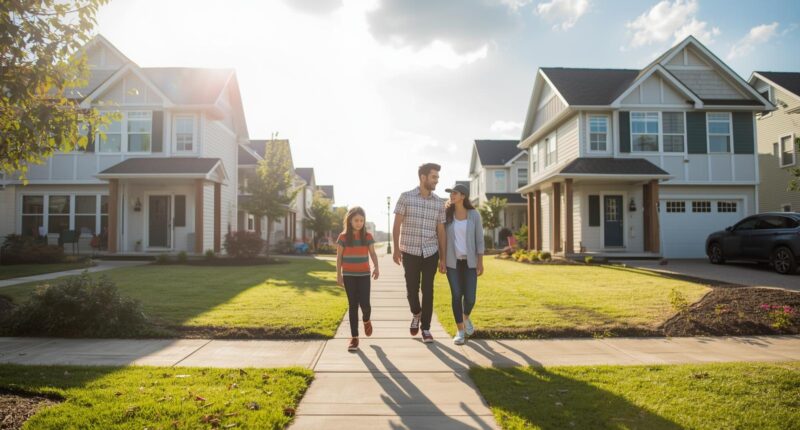Family-Friendly Living: Best Real Estate Options for Growing Families
Introduction
Finding the perfect home for your family is about more than square footage and price — it’s about Family-Friendly Living. Growing families need space, safety, and community to thrive. Whether you’re buying your first home or upgrading to a larger one, understanding which real estate options best suit your family’s lifestyle can make all the difference.
This guide explores the best real estate types, essential home features, and smart tips to help families find a perfect balance between comfort, convenience, and future growth.
What Does Family-Friendly Living Mean?
Family-Friendly Living is all about homes and neighborhoods designed to support family life. It emphasizes safety, good schools, green spaces, and a strong sense of community.
A truly family-friendly home should offer:
-
Sufficient space for every member
-
Access to education and healthcare
-
Nearby parks and recreational areas
-
Safe and peaceful surroundings
👉 Resource: Zillow’s Family Home Buying Guide
Why Family-Friendly Living Matters
Choosing a home isn’t just a financial decision — it’s an emotional one. A well-located, family-oriented property can shape your family’s daily life, happiness, and even long-term financial health.
Benefits of Family-Friendly Living:
-
Strong community connections
-
Safe environments for kids
-
Proximity to schools and amenities
-
Long-term property appreciation
-
Stability for raising children
A good neighborhood can make your home not just a place to live, but a place to grow.
Best Real Estate Options for Growing Families
| Property Type | Description | Best For |
|---|---|---|
| Single-Family Homes | Detached houses with yards and garages | Families wanting privacy & space |
| Townhouses | Multi-floor homes sharing side walls | Families wanting affordability & city access |
| Suburban Homes | Houses in peaceful residential areas | Families prioritizing safety & schools |
| Multi-Family Homes | Duplexes or triplexes with separate units | Families who want rental income options |
| Gated Communities | Secure neighborhoods with shared amenities | Families valuing safety & exclusivity |
Each option has unique benefits, depending on your family’s size, income, and lifestyle goals.
Key Home Features That Support Family-Friendly Living
1. Space to Grow
Families need room to expand — multiple bedrooms, spacious living areas, and storage for toys, equipment, or hobbies.
2. Functional Layouts
An open floor plan makes it easier for parents to supervise kids and host gatherings.
3. Outdoor Areas
A backyard or nearby park offers safe play space and encourages outdoor activity.
4. Proximity to Schools and Hospitals
Choosing a location close to quality schools and healthcare centers reduces commute time and stress.
5. Modern Safety Features
Smart locks, gated communities, and security systems enhance peace of mind for families.
👉 Link: Read our related post on Single-Family vs. Multi-Family Homes: Which Is Better? to help you decide which housing type fits your family’s future.
Top Locations for Family-Friendly Living in 2025
As urban development expands, some regions stand out for their strong communities, education systems, and family appeal.
Recommended Areas:
-
Suburban Zones Near Major Cities – Combine peace with accessibility (e.g., near Miami, Dallas, or Bangkok suburbs).
-
Coastal Communities – Offer relaxed lifestyles with recreation options.
-
Eco-Friendly Neighborhoods – Prioritize sustainability and child-safe environments.
These areas provide the perfect combination of lifestyle and long-term value for growing families.
Table — Factors to Consider Before Buying a Family Home
| Factor | Why It Matters | Ideal Range / Condition |
|---|---|---|
| School District Quality | Affects children’s education & resale value | Rated A or above |
| Neighborhood Safety | Impacts peace of mind & family security | Low crime index |
| Commute & Accessibility | Reduces stress & supports work-life balance | < 30 minutes from major areas |
| Home Size & Layout | Ensures comfort & adaptability | 3+ bedrooms, open floor plan |
| Outdoor & Recreational Space | Encourages family bonding | Nearby parks or playgrounds |
This comparison helps families balance emotional and practical needs when house-hunting.
The Role of Technology in Family-Friendly Homes
Modern Family-Friendly Living integrates smart technology for convenience and safety:
-
Smart Thermostats: Maintain ideal comfort levels.
-
Security Cameras & Smart Locks: Ensure 24/7 protection.
-
Home Automation Systems: Control lighting, temperature, and entertainment easily.
-
Energy-Efficient Appliances: Lower costs and support sustainability.
Tech upgrades not only make life easier but also increase property value.
Financial Planning for a Family Home
Buying a home for your family requires careful budgeting and smart financial management.
Steps for a Stress-Free Purchase:
-
Set a realistic budget including taxes, insurance, and maintenance.
-
Get pre-approved for a mortgage before searching.
-
Consider long-term expenses like schooling and utilities.
-
Plan for future family growth — not just current needs.
Strong financial planning ensures your dream home remains affordable and sustainable.
Pros and Cons of Family-Friendly Living
| Pros | Cons |
|---|---|
| Safe, peaceful environments | Higher cost in premium neighborhoods |
| Access to top schools and healthcare | Longer commute times in suburban areas |
| Great for children’s development | Less nightlife or entertainment options |
| Higher resale and property appreciation | Maintenance costs for larger homes |
Family-oriented neighborhoods often trade convenience for quality — a worthy exchange for most parents.
Final Thoughts
Family-Friendly Living is about creating a secure, nurturing, and joyful environment for everyone in your household. Whether you prefer a suburban home, townhouse, or multi-family property, the goal is to choose a space that supports your family’s dreams and daily comfort.
When you find the right home, you’re not just buying real estate — you’re investing in your family’s happiness and future.









